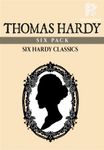37 books
-
1. The Return of the Native

A Saturday afternoon in November was approaching the time of twilight, and the vast tract of unenclosed wild known as Egdon Heath embrowned itself moment by moment. Overhead the hollow stretch of whitish cloud shutting out the sky was as a tent which had the whole heath for its floor. The heaven being spread with this pallid screen and the earth with the darkest vegetation, their meeting-line at the horizon was clearly marked. In such contrast the heath wore the appearance of an instalment of night which had taken up its place before its astronomical hour was come: darkness had to a great extent arrived hereon, while day stood distinct in the sky. Looking upwards, a furze-cutter would have been inclined to continue work; looking down, he would have decided to finish his faggot and go home. The distant rims of the world and of the firmament seemed to be a division in time no less than a division in matter. The face of the heath by its mere complexion added half an hour to evening; it could in like manner retard the dawn, sadden noon, anticipate the frowning of storms scarcely generated, and intensify the opacity of a moonless midnight to a cause of shaking and dread. In fact, precisely at this transitional point of its nightly roll into darkness the great and particular glory of the Egdon waste began, and nobody could be said to understand the heath who had not been there at such a time. It could best be felt when it could not clearly be seen, its complete effect and explanation lying in this and the succeeding hours before the next dawn; then, and only then, did it tell its true tale. The spot was, indeed, a near relation of night, and when night showed itself an apparent tendency to gravitate together could be perceived in its shades and the scene. The sombre stretch of rounds and hollows seemed to rise and meet the evening gloom in pure sympathy, the heath exhaling darkness as rapidly as the heavens precipitated it. And so the obscurity in the air and the obscurity in the land closed together in a black fraternization towards which each advanced halfway.
-
3. The Mayor of Casterbridge
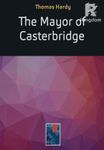
One evening of late summer, before the nineteenth century had reached one-third of its span, a young man and woman, the latter carrying a child, were approaching the large village of Weydon-Priors, in Upper Wessex, on foot. They were plainly but not ill clad, though the thick hoar of dust which had accumulated on their shoes and garments from an obviously long journey lent a disadvantageous shabbiness to their appearance just now. The man was of fine figure, swarthy, and stern in aspect; and he showed in profile a facial angle so slightly inclined as to be almost perpendicular. He wore a short jacket of brown corduroy, newer than the remainder of his suit, which was a fustian waistcoat with white horn buttons, breeches of the same, tanned leggings, and a straw hat overlaid with black glazed canvas. At his back he carried by a looped strap a rush basket, from which protruded at one end the crutch of a hay-knife, a wimble for hay-bonds being also visible in the aperture. His measured, springless walk was the walk of the skilled countryman as distinct from the desultory shamble of the general labourer; while in the turn and plant of each foot there was, further, a dogged and cynical indifference personal to himself, showing its presence even in the regularly interchanging fustian folds, now in the left leg, now in the right, as he paced along. What was really peculiar, however, in this couple’s progress, and would have attracted the attention of any casual observer otherwise disposed to overlook them, was the perfect silence they preserved. They walked side by side in such a way as to suggest afar off the low, easy, confidential chat of people full of reciprocity; but on closer view it could be discerned that the man was reading, or pretending to read, a ballad sheet which he kept before his eyes with some difficulty by the hand that was passed through the basket strap. Whether this apparent cause were the real cause, or whether it were an assumed one to escape an intercourse that would have been irksome to him, nobody but himself could have said precisely; but his taciturnity was unbroken, and the woman enjoyed no society whatever from his presence. Virtually she walked the highway alone, save for the child she bore. Sometimes the man’s bent elbow almost touched her shoulder, for she kept as close to his side as was possible without actual contact, but she seemed to have no idea of taking his arm, nor he of offering it; and far from exhibiting surprise at his ignoring silence she appeared to receive it as a natural thing. If any word at all were uttered by the little group, it was an occasional whisper of the woman to the child—a tiny girl in short clothes and blue boots of knitted yarn—and the murmured babble of the child in reply.
-
4. Tess of the D’Urbervilles

Tess of the D’Urbervilles was a controversial work when it first appeared in the early 1890s. The serialized version of 1891 was heavily censored and the full novel of 1892 received mixed reviews, largely because it challenged the s****l morals of late Victorian England. The book’s reputation has since grown considerably and it is now routinely cited as Thomas Hardy’s masterpiece. The richly descriptive narrative is rife with unforgettable vignettes of rural life in late 19th-century England but the story’s timeless power stems from its heart-wrenching romance and the tragic experiences – or fate, as Hardy might have put it - of the eponymous heroine.
-
5. Far from the Madding Crowd
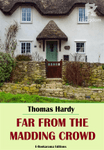
"Far from the Madding Crowd", was a popular attraction and Hardy's first critical success. It was first published in serial form in Cornhill magazine between January and December 1874, and then published the same year in London in book form. Hardy had already published several novels, but this was the first of the five novels that would assure his place in the annals of literature."Far from the Madding Crowd" tells the story of a young woman, Bathsheba Everdene, and the three men in her life: one is a poor sheep farmer who loses his flock in a tragedy and ends up working as an employee on Bathsheba's farm; one is the respectable, boring owner of a neighbouring farm who takes Bathsheba's flirtations too seriously; and the third is a dashing army sergeant who treats her like just another of his conquests. In chronicling their hopes, plans, and disappointments, Hardy presents to readers a clear example of Victorian romanticism. At the same time, his understanding of the lives of farmers and ranchers in rural England makes him a forerunner to the realistic tradition in literature.Wessex, the location for "Far from the Madding Crowd", is an imaginary English county that Hardy coloured with fine details throughout the course of his writing career. It is similar to Dorset, where Hardy lived most of his life, but its fictitious nature gave the author freedom to describe the landscape at will.
-
7. The Return of the Native
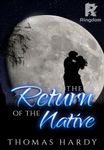
Clim Yeobright, tired of city life, returns from Paris to open a school on Egdon Heath and, in spite of the opposition of his mother, marries Eustacia Vye, a passionate, pleasure-loving girl who hopes to persuade him to return to Paris. The Return of the Native was controversial in its day, causing quite a stir when it first appeared in the January-December 1878 issues of the magazine Belgravia, a publication known for its sensationalism. Because of the novel"s risqué themes, author Thomas Hardy had difficulty finding a publisher. Today, The Return of the Native is one of Hardy"s most popular novels.
-
8. The Mayor of Casterbridge
The Life and Death of a Man of Character (1886) Set in the fictional town of Casterbridge (based on the town of Dorchester in Dorset), this is one of Hardy's Wessex novels. Henchard is a strong man brought low by his own faults of character and human failings. The book is a mix of love and conflict, fate and tragedy all contained within Hardy's unique area of Wessex.--Submitted by Anonymous
-
9. Jude the Obscure
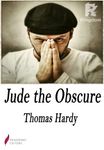
Jude the Obscure is a novel by Thomas Hardy, which began as a magazine serial in December 1894 and was first published in book form in 1895. It is Hardy"s last completed novel. Its protagonist, Jude Fawley, is a working-class young man, a stonemason, who dreams of becoming a scholar. The other main character is his cousin, Sue Bridehead, who is also his central love interest. The novel is concerned in particular with issues of class, education, religion, morality and marriage. Thomas Hardy OM (2 June 1840 – 11 January 1928) was an English novelist and poet. A Victorian realist in the tradition of George Eliot, he was influenced both in his novels and in his poetry by Romanticism, especially William Wordsworth. He was highly critical of much in Victorian society, especially on the declining status of rural people in Britain, such as those from his native South West England.
-
10. Jude the Obscure
(1895) "Yea, many there be that have run out of their wits for women, and become servants for their sakes. Many also have perished, have erred, and sinned, for women... O ye men, how can it be but women should be strong, seeing they do thus?"--Esdras. This, the last completed of Thomas Hardy's novels, began as a magazine serial in December 1894 and was first published in book form in 1895. Its protagonist, Jude Fawley, is a working-class young man, a stonemason, who dreams of becoming a scholar. The other main character is his cousin, Sue Bridehead, who is also his central love interest. The novel is concerned in particular with issues of class, education, religion and marriage. Highly controversial when it was first published, with outcries from the Victorian public for its frank treatment of s*x, it was often referred to as "Jude the Obscene". Heavily criticised for its apparent attack on the institution of marriage through the presentation of such concepts as erotolepsy, the book caused further strain on Hardy's already difficult marriage because Emma Hardy was concerned that Jude the Obscure would be read as autobiographical. This is an almost unbearably sad story about love and s****l desire mapped into the peculiar English matrixes of class and destiny in the Victorian 19th century, has come to be recognized as one of Hardy's most important novels. It tells the tragic story of Jude Fawley, a kid from the country whose aspirations to university scholarship are thwarted; his socially unacceptable love affair is also a disaster. This is a great novel written by Thomas Hardy. Jude Fawley is an orphan boy, fostered by his Aunt. Disqualified from university because he belongs to a poor family, he tries to survive but fails in both love and education. Jude is confused between sensual love, which is represented by Arabella, and spiritual love, represented by Sue Bridehead.--Submitted by fahim This intensely bleak novel contains themes already explored in Hardy's previous novels: social injustice, the position of women in Victorian society, the hypocrisy of religion and the invalidity of existing societal mores. However, the over-arching theme of the novel is the human condition, which Hardy believes is inescapable and inevitable. In his later novels Hardy not only denies the presence of God, but seems to see the world as being ruled by a malevolent deity. His atheism precedes the twentieth century novels of James Joyce and D. H. Laurence. A recurrent theme is that of the uselessness of trying to atone for previous "mistakes": Fate will always prevail and no beneficent God will offer forgiveness. This is true of Sue in "Jude", who feels that by flouting contemporary values she has defied God, who is now punishing her. Fate also traps Henchard (Mayor of Casterbridge), and Tess (Tess of the D' Urbervilles), whose dark ending makes explicit man's vulnerability to external dark forces. I have mentioned these other two novels because they have elements in common with "Jude". Hardy depicts the world as he sees it, dark and bleak where escape from one's Fate is impossible, and to paraphrase Elizabeth (Major of Casterbridge), happiness is merely a short interlude in a malevolent world turbulence. My introduction is designed to set "Jude" in context and encourage exploration of links with Hardy's other great novels.--Submitted by Jill Giannotta Jude the Obscure is a work by Thomas Hardy that takes the reader on a young man's discovery of himself and the world- the world as we too often bleakly find it as opposed to the world of sparkling wonder we too often wish it to be. Hampered by class and convention, struggling with desire and the desire to be moral, Jude aspires to a career above his station and aspires to love, successfully, a woman he cannot fully understand. His struggle is a valiant one, in the face of foes and frustration, the outcome being a lesson learned by so many that life may not take us where we wish to go, yet, on the journey, chance teaches much and atones for more.--Submitted by Claire
-
11. The Mayor of Casterbridge
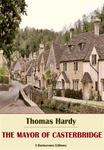
"The Mayor of Casterbridge" is a classic novel written by Thomas Hardy. The novel was first published in 1886 under the complete title "The Mayor of Casterbridge: The Life and Death of a Man of Character".It is considered as one of the best novels written by Hardy and is particularly recognised for the complex manner in which the character of the protagonist Michael Henchard has been crafted by him.In "The Mayor of Casterbridge", Thomas Hardy set out to examine how a man's choices affect his life in the long run. Set in the early nineteenth-century in Casterbridge, a fictional town in Dorset in southwestern England, Hardy used his unique understanding of the poor and the rich to create the unique plot."The Mayor of Casterbridge" is, from beginning to end, the story of Michael Henchard, a skilled farm labourer who, in a drunken rage, sells his young wife, along with their infant child, to a passing sailor. Most of the novel takes place eighteen to twenty years after this event. When the sailor is reported lost at sea, the cast-off wife and now-grown daughter set out to find Michael, who has become an affluent businessman and the mayor of Casterbridge. Michael's success is temporary, though, as circumstances and his own weaknesses of character combine to bring about his downfall in spite of his attempts to right the wrong he committed years before.
-
12. Far from the Madding Crowd
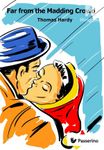
"Far from the madding crowd" (1874) is Thomas Hardy"s fourth novel and his first major literary success. Gabriel Oak is a young shepherd. With the savings of a frugal life, and a loan, he has leased and stocked a sheep farm. He falls in love with a newcomer six years his junior, Bathsheba Everdene, a proud beauty who arrives to live with her aunt, Mrs. Hurst. Over time, Bathsheba and Gabriel grow to like each other well enough, and Bathsheba even saves his life once. However, when he makes her an unadorned offer of marriage, she refuses; she values her independence too much, and him too little. Feeling betrayed and embarrassed, Gabriel offers blunt protestations that only foster her haughtiness. After a few days, she moves to Weatherbury, a village some miles off... Thomas Hardy, (2 June 1840 – 11 January 1928) was an English novelist and poet.
-
13. Tess of the d'Urbervilles
A Pure Woman: Faithfully Presented (1891) Attracting harsh criticism for its sympathetic portrayal of a "fallen woman", this novel was initially refused publication. This novel is generally regarded as Hardy's finest. A brilliant tale of seduction, love, betrayal, and murder, Tess of the d'Ubervilles yields to narrative convention by punishing Tess's sin, but boldly exposes this standard denouement of unforgiving morality as cruelly unjust. Throughout, Hardy's most lyrical and atmospheric language frames his shattering narrative. The novel centers around a young woman who struggles to find her place in society. When it is discovered that the low-class Durbeyfield family is in reality the d'Urbervilles, the last of a famous bloodline that dates back hundreds of years, the mother sends her eldest daughter, Tess, to beg money from relations with the obvious desire that Tess wed the rich Mr. d'Urberville. Thus begins a tale of woe in which a wealthy man cruelly mistreats a poor girl. Tess is taken advantage of by Mr. d'Urberville and leaves his house, returning home to have their child, who subsequently dies. Throughout the rest of this fascinating novel, Tess is tormented by guilt at the thought of her impurity and vows to never marry. She is tested when she meets Angel, the clever son of a priest, and falls in love with him. After days of pleading, Tess gives in to Angel and consents to marry him. Angel deserts Tess when he finds the innocent country girl he fell in love with is not so pure. ~ I am so happy that in my teenage years I found this marvellous book in a second hand book shop. Till then I was not aware of Sir Thomas Hardy. I started reading and found that it was hard to put down. Being a strong adorer of mother Nature, I was thrilled by the author's minute descriptions of nature in old England. I was dumbfounded by his observations and narration. Coming to the story, I became an immediate fan of the Tess, the heroine. In other words I can say that her character has changed me and my personality. Her simplicity, innocence, perseverance, dedication and most importantly her love made me to be always like her in my daily life. Instantly Hardy became my favourite author and I never stopped reading almost all of his novels. Every person who likes romantic novels must read this novel first. I will never forget Tess in my life.--Submitted by Velijala Phanindra Charya, India
-
14. A Group of Noble Dames
That is to say, The First Countess of Wessex, Barbara of The Hose of Grebe, The Marchioness of Stonehenge, Lady Mottifont, Squire Petrick's Lady, The Lady Icenway, Anna, Lady Baxby, The Lady Penelope, The Duchess of Hamptonshire; and The Honourable Laura (1896) ". . . Store of Ladies, whose bright eyes, rain influence."--L*******.
-
15. The Return of the Native
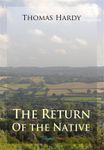
The Return of the Native is one of Hardy's most popular novels pioneering such themes as s****l politics, thwarted desire, and the conflicting demands of nature and society, a truly a truly modern novel written ahead of its time. Underlying these modern themes, however, is a classical sense of tragedy: Hardy scrupulously observes the three unities of time, place, and action and suggests that the struggles of those trying to escape their destinies will only hasten their destruction.
-
17. The Dynasts
Hardy's magnum opus set during the Napoleonic wars, classified as a closet drama because of its extensive scope and content. In three parts, published in 1904, 1906, and 1908 respectively. The Time covered by the Action being about Ten Years. And I heard sounds of insult, shame, and wrong, And trumpets blown for wars."
-
19. Under the Greenwood Tree
or; The Mellstock Quire A rural painting of the Dutch school. First published anonymously in 1872. Thomas Hardy's novels are exceptionally descriptive of nature and emotional feelings of each individual characters and the reflections of life. Under the greenwood tree is indeed a novel so immensely written to picturise the 18th century society and the closeness of the social fabric during that time. It is a superb presentation of various seasons. The feminine character of Miss Fancy and the true love and emotions with d**k Duwey is a classical presentation of the life style and the real world feelings interestingly woven as a love plot with unassumed gesture. I read this novel as a student at the age of 18, and after 42 years, I had the opportunity to read it once again. I am extremely delighted as my mind rolled back to those times. I recommend strongly this novel especially to younger generation to learn many things of life.--Submitted by Dr. Adibhatla Santharam
-
20. Far From the Madding Crowd
(1874) Hardy took the title of this novel from Thomas Gray's poem Elegy Written in a Country Churchyard (1751): Far From the madding crowd's ignoble strife Their sober wishes never learn'd to stray; Along the cool sequester'd vale of life They kept the noiseless tenor of their way. In this case "Madding" means "frenzied". The title may be ironic: the five main characters -- Bathsheba, Troy, Boldwood, Oak, and Fanny Robin -- are all passionate beings who find the "vale of life" neither quiet nor cool. Hardy said that he first introduced Wessex in this novel. It was successful enough for him to give up architectural work and pursue a literary career. A man struggling to make a future for himself, Gabriel Oak works hard and passionately as a sheep herder. He takes out a loan on good faith only to have his prospects run over a cliff. The catalyst to this need to succeed starts at the sight of Bathsheba Everdene, a head-strong young woman visiting relatives in the country. At first sight he is in awe but she is indifferent. After a series of events, let-downs and deaths, the two find themselves face-to-face again after an embarrassing confrontation months earlier. The only difference is that there is a significant role reversal in status and sense. Thrown together in the name of great farming, they loathe and avoid each other at all costs. Bathsheba, our immature heroine, plays with hearts, but eventually knows the pain that she has caused. Fueled by the doubts of so many that such a woman could run a farm, she forges ahead, agreeing to heartless arrangements. But the oddities of fate save her from herself and set her on the right road. After what seems like a painfully long time, she grows up and listens to the small wise voice of her heart. Hardy does readers a favor by relating the realistic selfishness of everyday people and their struggle for happiness--illustrating that while we can be extremely stupid at times, the heart can also make us wise.--Submitted by Melissa Gabriel Oak -- a man of good nature and intentions. He goes to church on Sundays - although he does not always listen and thinks more about dinner - and does honest work for his money. Bathsheba Everdene - a middle class woman who does not always make the right decisions and often acts on impulse, but really does care for the ones she loves. These two people are the hero and heroine of the novel. One is an ordinary farmer who can get by. The other is an upper class bailiff who has inherited a farm and workers. They meet when Bathsheba visits her Aunt. Oak develops an attraction to her and soon they frequently bump into each other. Oak happens to be looking for a job at one point in the novel and Bathsheba has one going! It is a perfect opportunity for Oak to get to know Bathsheba. The novel is one of romance and passion. When the reader puts it down after reading a couple of chapters, they are left with questions buzzing around their minds - how will Mr. Boldwood react with the Valentine? Will Oak have pity and help Boldwood and Bathsheba? What is Bathsheba going to do, now that Troy has declared his love of another woman? This is an exciting read and will leave the reader itching for more.--Submitted by L.R.S. This is one of the finest of Thomas Hardy's novels. Thomas hardy specialized in writing novels that probed deep into the human soul. Since he did that he was able supremely to show his characters not just in thought but in action too. This novel is the story of a woman and how a single flaw in her soul leads to devastating consequences for her and the men she meets and relates to in different ways. It is also the story of a woman finally coming to terms with life, understanding herself, discovering real things, living in real happiness. In a way the characters are shockingly recognizable and by doing that Hardy brings out all our observations to the surface and intimately and thoroughly exposes and discusses that not didactically but as a story! That is the inexpressible beauty of the novel and in fact all his novels. You can spend time profitably reading it. You will identify with the characters and their trials, tribulations, joys and sorrows. You will be led by the wisdom of hardy to look at the characters deeply and starkly and you will experience the feeling of being a kind of God who can see the deep workings of the human soul. That is the power of Hardy's novels and especially of this one. He writes with care, delicacy, sympathy and yet with an unparalleled ruthlessness. There is no cheap sentiment or obfuscation here, there is s recreation of life and you can take it or leave it but it is vibrant and real. It is a thought experiment...What happens when such and such meets such and such? In that sense the novel is suspenseful and entertaining in that higher sense and it is difficult to stop after you have crossed the first 20 pages. Try it and you will see all of the above and more to be true. Do not go from life without reading Hardy. You will miss something tremendous and vibrant. Happy discovery!--Submitted by Narendra Kumar Vellanki This is probably my favorite book ever. My introduction will not do it justice and/or spoil the plot -- at a very basic level. Bathseba Everdene rejects Gabriel Oak's proposal - because she is too young yet to know if the match is a wise one for her. She inherits her Uncle's farm and with the strength and ambition of youth determines to manage the estate herself, not realizing that Oak has her back the whole time. When she sets in motion events that cause her elder neighbor, Boldwood, to fall in love with her, she does not reject, but postpones the decision to accept his proposal. Then she meets the dazzling Sgt.Troy, succumbs completely to youthful desire, and hastily marries him. And then nature takes it course... Having read this novel several times during various decades of my life, it becomes more clear with each reading the author is making a profound statement on mankind's position within the universe. Old generations must give way to the present generation. The present generation must be careful not to be so impatient, self indulgent and short-sighted in the rush to modernization. Attempts to speed up nature in this manner may result in tragedy. Gabriel owns a watch that can tell the minutes with precision, but the hours can be off so he uses the stars to tell time. Respect and attention to the rhythms and smallest details or nature, and also to the vastness of the universe, all simultaneously, can guide mankind towards a more peaceful, happy existence. While the main characters illustrate this core message beautifully, Hardy also uses supporting details from descriptions of the sky, the landscape, architecture, and animals (especially the dogs!) to share his lesson. Everyone should read this book several times, and keep a dictionary at hand - Hardy uses some terms that have concise meaning contemporary to his time, but may not be so well known in our present day. (To me that just reinforces the whole experience.)--Submitted by Anonymous
